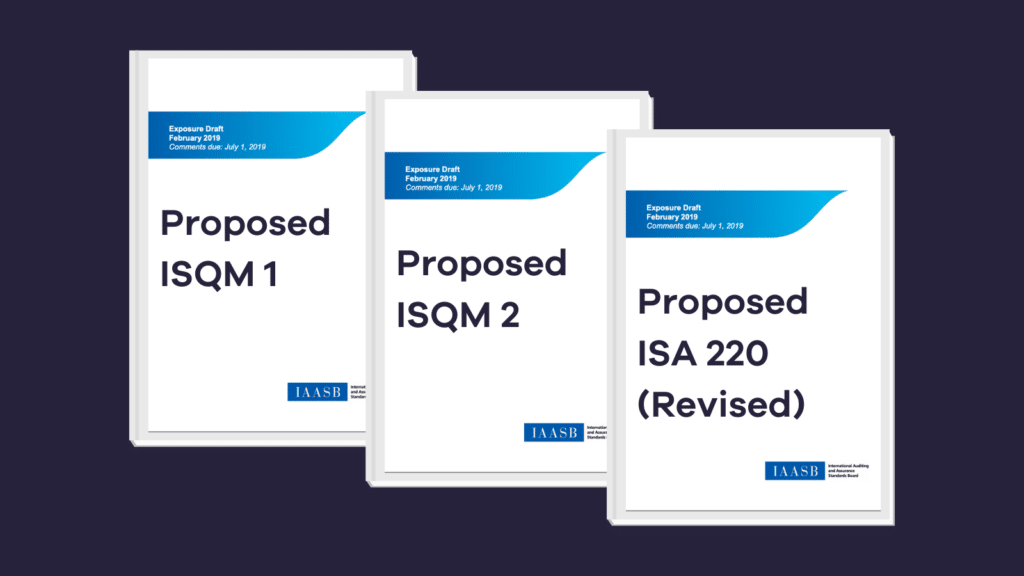Request a Dayshape demo
Get in touch and learn first-hand how Dayshape can help boost profitability, improve client service, and keep your teams happy.
Platform
Strategic resource management
Optimize margins. Grow revenue.
Plan reliably. Act confidently.
Inspire teams. Delight clients.
Enterprise scalability
Use Cases
How Dayshape helps firms
10 ways for resource managers to elevate their impact

Elevate your role, expand your influence, and drive impact across your firm.
Listen nowCustomer Success
Value at every stage
Company
More about Dayshape
Resources
Learn more
Resources
Featured resources
Resource Management Maturity

The complete blueprint to transform your resource management.
Learn moreThe proposals change the way professional accountancy firms are expected to manage quality for audits, reviews, and other assurance and related services engagements.

The new standards for quality management comprise of three interrelated quality standards, outlined below:
• ISQM 1
• ISQM 2
• ISA 220 Revised
The standards will require firms to proactively manage quality with a renewed focus on engagement quality reviews. This will affect how firms are organized and operate. The risk-based approach will require 'more robust systems to improve quality'. Of the three standards, ISQM 1 is likely to have the most significant impact at a firm level.
ISQM 1 is part of IAASB's suite of quality management standards and aims to enhance the robustness of the firm's system of quality management (SOQM). The key objectives of the ISQM 1 standards include:
• Enhancing firm governance and leadership
• Improving information and communication
• Proactive monitoring of the SOQM as a whole
• Introducing a more tailored approach to managing quality
• Establishing an ongoing culture of 'commitment to quality'
• Modernizing the standard to reflect factors affecting the firm’s environment

The eight components of the proposed quality management system are specifically designed and described as highly integrated. For example, resources and information and communication are essential aspects that enable the operation of each of the other components of the system of quality management.
The integration of the components means that quality management doesn't operate in a linear manner. As a result, ISQM 1 envisions aspects would be designed, implemented, and operated by firms in an iterative manner.
A number of our customers have started planning for the ISQM 1 requirements. We've been exploring how our AI-powered planning platform can help, and have identified some immediate ways it can support firms in meeting the requirements.
ISQM 1 defines this component as 'the firm’s processes for consideration of matters in determining whether to accept or continue a client relationship or specific engagement... This component also requires that the firm’s financial and operational priorities do not lead to inappropriate judgements about whether to accept or continue a client relationship or specific engagement. '
Dayshape's configurable approval workflows can ensure engagement plans are reviewed by the right people, as well as ensuring enforcement of independence restrictions and accreditation compliance. Rather than requiring information to be reconciled from multiple systems (or spreadsheets), Dayshape can serve as an engagement risk acceptance tool, maintaining a single source of truth.

The engagement performance component includes firms' actions to 'promote and support the consistent performance of quality engagements in accordance with professional standards and legal and regulatory requirements.' This section of the standard also requires firms 'establish policies or procedures addressing the nature, timing and extent of the direction and supervision of engagement teams and review of their work, including that such direction, supervision and review is planned and performed on the basis that the work performed by less experienced members of the engagement team is directed, supervised and reviewed by more experienced engagement team members.'
Dayshape allows engagement leaders to create an engagement plan, manage budget approvals, track changes and monitor progress, all in one place. Alerts and notifications are configurable and can be triggered by being off-target burndown, likely to miss recovery rate, and more. Performance data can be accessed through templated or custom reporting, with no requirement for manual or repeated data entries.
Dayshape's engagement economics feature provides real-time financial data for key measures, such as budget vs actuals, cost to complete, margin and recovery rate.

This component covers firms' processes for 'obtaining, developing, using, maintaining, allocating or assigning resources to enable the design, implementation and operation of the system of quality management'. Our customers highlighted this as being a critical requirement for which Dayshape can provide unique and comprehensive support, specifically to help ensure 'the firm assigns an engagement partner and other human resources to each engagement who have appropriate competence and capabilities, including being given sufficient time, to consistently perform quality engagements. ' Similarly, Dayshape can support the assignment of 'human resources to perform activities within the system of quality management who have appropriate competence and capabilities, including sufficient time, to perform such activities. '
Dayshape allows Engagement Managers to specify resource needs, specifying all knowledge and technical accreditation requirements, as well as the level of experience of the individual. Engagement partners can drive optimal delivery by looking at their firm nationwide or globally, and understand future headcount requirements with in-depth reporting of predicted surplus or shortfall versus demand.
With assisted or fully automated scheduling, Dayshape can help to ensure skills, availability, location, and all key criteria are accounted for when assigning engagements.
ISQM 2 eligibility can be tracked as a trait against quality reviewers, and this can be used in Dayshape's configurable workflows to determine who is a suitable quality reviewer for a given engagement.

This component includes the requirement to establish an information system 'whether through the use of manual or automated elements, to identify, capture, process and maintain relevant and reliable information. '
Dayshape is specifically designed as an information system capable of maintaining and managing resource data, performing the budgeting and allocation process, and providing real-time reporting. It integrates with other systems such as time recording systems to reduce manual intervention.
Dayshape helps to promote a culture of transparency by offering a view of engagement performance to most users by default, and configurable to your firm's needs.
Monitoring involves 'undertaking ongoing and periodic monitoring activities, and identifying and evaluating deficiencies...'. In order to understand how the deficiencies arose, this ISQM also requires the firm to understand the root cause of the identified deficiencies. The standard also requires the firm takes appropriate actions to respond to identified deficiencies such that 'deficiencies are remediated on a timely basis'.
Dayshape monitors and flags up engagements that might need attention, for example where target deadlines are being missed. Real-time tracking of project performance ensures advance notice of potential overruns. Automated alerts are available should breaches of metrics occur, ensuring relevant partners or managers are notified immediately.
Full audit trails are available for every engagement, allowing the project to be “rewound” to any time in the past, and facilitating continuous improvement of decisions.
Get the latest insights and updates delivered to your inbox weekly.
Explore our latest insights and strategies for success.

15 min read

4 min read

5 min read
Discover how AI can transform your resource management and enhance your project delivery.

Get in touch and learn first-hand how Dayshape can help boost profitability, improve client service, and keep your teams happy.
